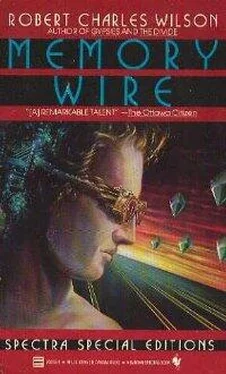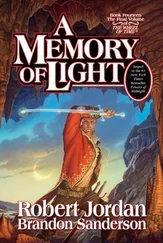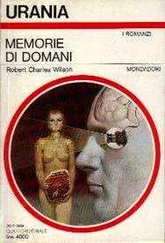Robert Wilson - Memory Wire
Здесь есть возможность читать онлайн «Robert Wilson - Memory Wire» весь текст электронной книги совершенно бесплатно (целиком полную версию без сокращений). В некоторых случаях можно слушать аудио, скачать через торрент в формате fb2 и присутствует краткое содержание. Год выпуска: 1987, ISBN: 1987, Издательство: Bantam Spectra, Жанр: Фантастика и фэнтези, на английском языке. Описание произведения, (предисловие) а так же отзывы посетителей доступны на портале библиотеки ЛибКат.
- Название:Memory Wire
- Автор:
- Издательство:Bantam Spectra
- Жанр:
- Год:1987
- ISBN:978-0-553-26853-9
- Рейтинг книги:4 / 5. Голосов: 1
-
Избранное:Добавить в избранное
- Отзывы:
-
Ваша оценка:
- 80
- 1
- 2
- 3
- 4
- 5
Memory Wire: краткое содержание, описание и аннотация
Предлагаем к чтению аннотацию, описание, краткое содержание или предисловие (зависит от того, что написал сам автор книги «Memory Wire»). Если вы не нашли необходимую информацию о книге — напишите в комментариях, мы постараемся отыскать её.
Memory Wire — читать онлайн бесплатно полную книгу (весь текст) целиком
Ниже представлен текст книги, разбитый по страницам. Система сохранения места последней прочитанной страницы, позволяет с удобством читать онлайн бесплатно книгу «Memory Wire», без необходимости каждый раз заново искать на чём Вы остановились. Поставьте закладку, и сможете в любой момент перейти на страницу, на которой закончили чтение.
Интервал:
Закладка:
Oberg fought down a response. What this means, he thought grimly, is that they’ve fucked up. The stone is gone, the Americans are gone. They had Ng. But Ng was a consolation prize at best.
He experienced a brief flurry of contempt for Andreazza and his soldiers, for the swarming anarchy of Pau Seco. It had astonished him at first, the primitiveness of this place. It was an accident of history, of course, the consequence of a series of diplomatic compromises that had concluded the shooting war in Brazil. But, he thought with some desperation, they don’t know. They didn’t know how important all this had become. SUDAM didn’t know and the civilian government didn’t know or care, and he wondered whether even the Agencies really understood what their own research had uncovered.
But Oberg knew. He had experienced it. He understood.
The burden of this interdiction had fallen to him. And it was not finished yet. Maybe Andreazza had screwed up. But there was still time.
“I’m sorry,” he said carefully. “If I offended you, then I apologize for that. It’s just that I would very much like to see this man Ng.”
Andreazza allowed himself a narrow smile. “Maybe I can arrange it. If you’d like to wait?”
And so the seconds ticked by. Seconds, Oberg thought, minutes, hours… days. While the contagion threatened to spread.
2. Ng was in a dazed condition when they took him to see the Agency man, Stephen Oberg.
He was dazed because the military interrogators had been at him. They had intercepted him when he tried to run a blockade down one of the logging roads east of Pau Seco, and they had brought him back here, to the cinderblock building that served as a jail. They put him in a cell that was too hot in the daylight and too cold at night, and for two consecutive afternoons they tortured him.
The torture was pedestrian. It was not what they did that frightened him so much as their clumsiness at it. There was a plastic bag they put over his head to suffocate him, and he was worried that they might be too stupid or inexperienced to know when to take it off. Altogether, it was archaic. They played good-guy bad-guy with him. There was a tall sertao Indian in a disheveled military uniform who spoke sympathetically to him between torture sessions and promised him leniency—“I won’t let these bastards touch you”—but only, of course, if Ng would detail his involvement in the theft of the oneirolith. Ng was careful to seem tempted by this offer, in order to prolong the respite from the pain. But he never confessed.
The next day they tied his wrists and ankles to a two-by-four which they hauled up on a rope to the ceiling beams, and then they struck him with broom handles until he was spinning sickeningly and in great pain. He vomited once, and they beat him harder for it. After a time he passed out. Still he did not confess.
During the coldest passage of the night, when he could not sleep for the pain of his injuries, he wondered why this was. Why not confess? It was hardly a matter of principle. It was theft, he thought, not revolution. He was not a partisan, nor was he a martyr. He had no desire to be a martyr.
Still he resisted. In part it was his constitution—literally, the way he was made. He was a creche soldier. His body was good at the chemistry of aggression and not very good at the chemistry of fear. So he was not afraid, and the pain, although it was terrible, was endurable in the absence of fear. Death frightened him—he was at least that human—but he knew he would be killed whether he confessed or not, and so confession was only useful as a way of abbreviating the pain. He would reach that point, certainly. But not yet.
Too, there was a part of him that didn’t belong to the military creches at Danang, a willfulness for which he had often been chastened. It’s the risk you take, a Khmer geneticist once told him, with this kind of chemical tampering. Aggression bordered on rebellion. He was headstrong. They had told him so at Danang. They had beaten him for it.
He had performed loyally in the Pacific Rim offensives, and he had killed a lot of posseiros, and he could not honestly say it was a moral revulsion that had drawn him away from the military after the war. Maybe that, too, in part. But he guessed his moral sensibilities were as poorly developed as his capacity for fear. What he felt was more personal. Brazil had astonished him. It was huge in every dimension. He had never guessed a single nation could contain so much variety of wealth, poverty, landscape. He sensed a world beyond the narrow margins he had been raised to recognize. He wondered, finally, if there might not be a life for him here, some destiny more subtle than career soldiering in Thailand or the Philippines or in occupied Manchuria. He disappeared during a recreational leave in Sao Paulo a week after the peace was declared. He became an illegal.
As an illegal he had no rights and was constantly vulnerable to arrest, but he had been able to secure a series of lumbering jobs that led him increasingly closer to the frontier and finally, a few years ago, to Pau Seco. The oneirolith mine fascinated him. The scope of the effort fascinated him, the strangeness of it, the wild contrasts of poverty and fortune. If there was a role for him to play, he thought, it was here.
Well. It was a faulty intuition. Unless, of course, this was his role, the unintended role of victim and martyr, and the cautionary role he would play, hanging by the neck on the gallows hill above the old town.
But he did not blame himself and he did not blame the Americans. He had been offered—and briefly possessed—a startling sum of money. From his new perspective it seemed trivial, but that was death-cell thinking: the money might have bought him a new life, and given the decision to make again, he might make it the same way. He had gambled and lost.
Bad calculation, then. But was that all? No.
Something else.
In the years since the war he had developed a loathing for the sort of men who controlled Pau Seco, for Andreazza and his brutal soldiers and for the garimpeiros like Claudio who exploited their laborers. And in the brief time he knew her, he had developed a guarded sympathy for the American woman, Teresa, who was so startlingly guileless she seemed to exist in another universe. It was a moral sensibility as primitive as his fears but, Ng thought, at least as strong. And maybe, at the base of it, that was why he had frustrated his torturers. He had learned how to hate them.
Oberg was a different case. He already hated Oberg. He had hated him for years.
Ng was aware of the pressure of Oberg’s eyes as the guards hustled him into the tiny interrogation room. There were two gray-uniformed peacekeepers in the room as well as the military man Andreazza, but the tension was obvious and direct: it passed between Oberg and Ng.
But I have the advantage, Ng thought. He doesn’t know who I am. But I know all about him.
The guards dropped him into a cruelly straight-backed wooden chair. Ng gasped and almost fainted with the pain. There had been blood in his urine this morning, and he was worried that his injuries might be more serious than he had thought.
Maybe these people had already killed him. Maybe he was only waiting to die.
He took deep, ratcheting breaths until his heart was steady and he was able to hold up his head. A swimming blackness obscured his vision. He looked at Oberg and Oberg seemed to be standing at the end of a tunnel now, distant and strange.
Now Oberg was talking.
Oberg said the predictable things. He said he knew all about Ng’s connection with Cruz Wexler and the conspiracy to sell the oneirolith. Witnesses, he said, had confirmed the exchange at the bar in the old town. He said he knew the Americans had left Pau Seco and that he wanted Ng to tell him how they had escaped and where they might have gone.
Читать дальшеИнтервал:
Закладка:
Похожие книги на «Memory Wire»
Представляем Вашему вниманию похожие книги на «Memory Wire» списком для выбора. Мы отобрали схожую по названию и смыслу литературу в надежде предоставить читателям больше вариантов отыскать новые, интересные, ещё непрочитанные произведения.
Обсуждение, отзывы о книге «Memory Wire» и просто собственные мнения читателей. Оставьте ваши комментарии, напишите, что Вы думаете о произведении, его смысле или главных героях. Укажите что конкретно понравилось, а что нет, и почему Вы так считаете.












